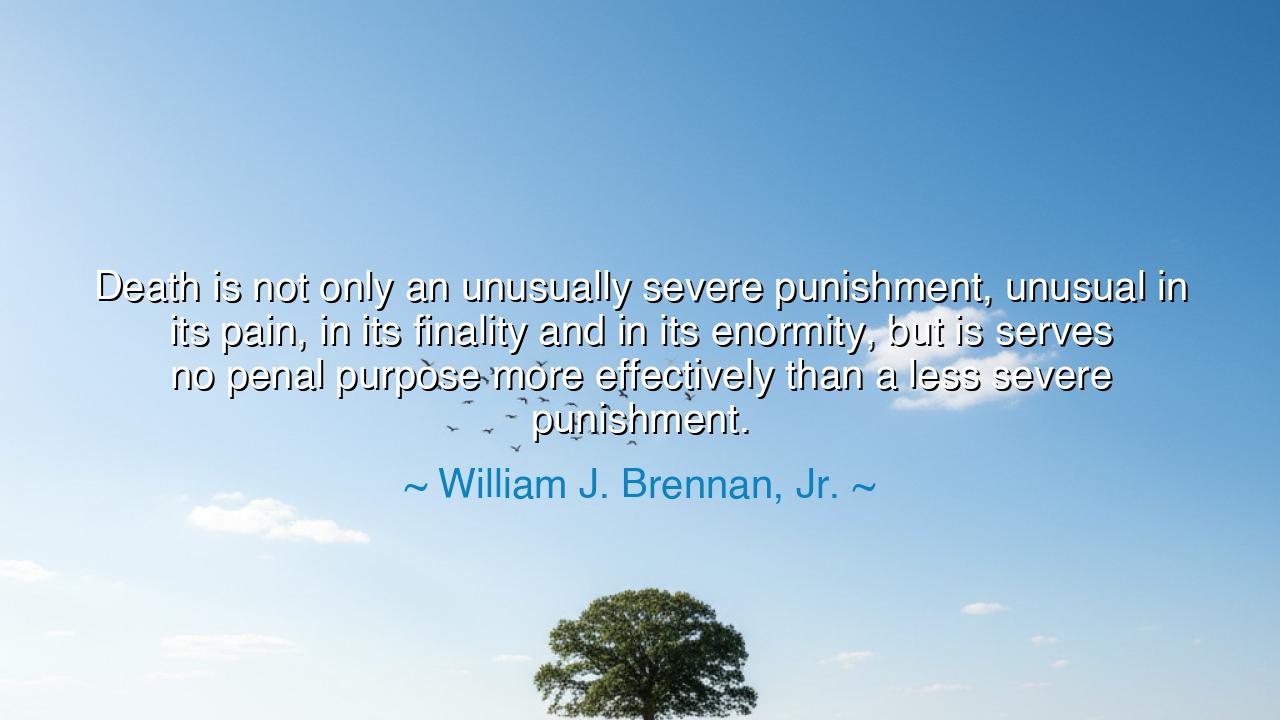
Death is not only an unusually severe punishment, unusual in its
Death is not only an unusually severe punishment, unusual in its pain, in its finality and in its enormity, but is serves no penal purpose more effectively than a less severe punishment.






“Death is not only an unusually severe punishment, unusual in its pain, in its finality and in its enormity, but it serves no penal purpose more effectively than a less severe punishment.” So spoke Justice William J. Brennan, Jr., a voice of conscience upon the bench of the United States Supreme Court. His words, solemn and deliberate, are not those of a man speaking only of law — they are the cry of one who has looked deeply into the heart of justice and found within it a reflection of human mercy. Brennan saw that the death penalty, though ancient and shrouded in the language of retribution, was a relic of fear, not wisdom. His statement is both a moral and philosophical judgment — that to take a life in the name of the law is not justice perfected, but justice undone.
To understand his words, we must remember the world from which they rose. Brennan served during the mid-twentieth century, a time when nations everywhere were questioning the ethics of punishment and the value of human dignity. The horrors of war, the revelations of genocide, and the rise of human rights had begun to teach mankind a difficult truth — that civilization cannot be measured by the number of its victories, but by its compassion toward the condemned. Against that backdrop, Brennan’s voice rose like a steady flame. He declared that death, once thought to be the ultimate expression of justice, was instead a sign of moral failure, for it extinguished not only the life of the guilty but the very possibility of redemption.
In calling death “unusually severe,” Brennan spoke not of its physical pain alone, but of its finality — the cold and irreversible silence it imposes. Every punishment short of death allows for repentance, for learning, for the correction of human error. But death — once carried out — offers no such grace. It is absolute, beyond amendment, beyond forgiveness, beyond time itself. And because human judgment is fallible, he reasoned, to wield such final power is to play at being gods — and that, in the eyes of both law and spirit, is an act of hubris.
History has borne witness to his warning. Consider the case of George Stinney Jr., a Black child of only fourteen years, executed in South Carolina in 1944. Convicted by an all-white jury in less than three hours, with no evidence and no defense, he was put to death in an electric chair so large they had to stack books beneath him. Decades later, he was proven innocent. His execution, once wrapped in the solemnity of justice, now stands as a scar upon the conscience of a nation. Brennan’s words speak directly to such tragedies — for in them we see that finality without certainty is not justice, but cruelty disguised in law’s clothing.
When Brennan said that death “serves no penal purpose more effectively than a lesser punishment,” he challenged not only the state but the soul of humanity. What does the killing of the condemned achieve that imprisonment cannot? It does not deter crime more surely; it does not heal the wounds of the victims’ families; it does not restore balance to the world. Instead, it teaches the people that killing, when sanctioned, can be righteous — that vengeance, when ritualized, becomes virtue. But the wise know that violence cannot cleanse violence, nor can blood undo blood. In this, Brennan joined a chorus that stretches back through the centuries — from the prophets who cried, “Thou shalt not kill,” to the philosophers who taught that justice is mercy disciplined by truth.
There is a deeper wisdom in his words, one that transcends law. For what Brennan truly speaks of is the value of human life — not in its perfection, but in its potential. To execute a man is to declare that his existence holds no further meaning, that he can never rise above his crime. But the ancient teachers knew better. They taught that as long as breath remains, transformation is possible. The murderer may yet learn sorrow; the thief may yet learn generosity; the heart that once harmed may yet learn to heal. When we deny another that chance, we deny the divine spark within ourselves — the same spark that distinguishes justice from revenge, civilization from barbarism.
The lesson, then, is this: the strength of a society is not measured by its power to punish, but by its capacity to forgive. To uphold the sanctity of life, even in the face of evil, is the highest expression of moral courage. Let us not be deceived by the false nobility of death’s finality. Instead, let us strive for justice that restores, that reforms, that recognizes the sacred worth of every human soul.
So, remember the wisdom of William J. Brennan, Jr.: that mercy is not weakness, and life is not ours to take. To seek justice without cruelty is to walk the narrow road of the wise — where compassion tempers power, and where punishment serves not vengeance, but the healing of all. For when law and mercy walk hand in hand, even the darkest heart may yet find its way back into the light.






AAdministratorAdministrator
Welcome, honored guests. Please leave a comment, we will respond soon